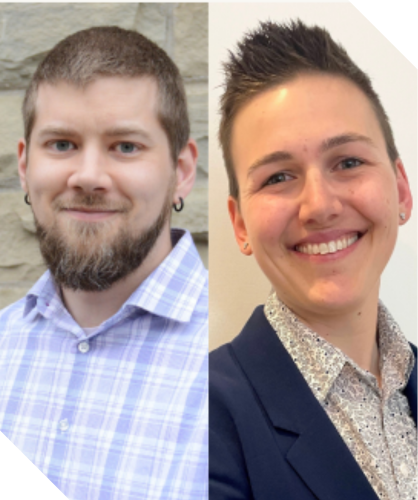Short courses

These unique virtual short courses are delivered twice a year. Once in the spring and fall. The courses are for graduate students, public health professionals, data science professionals who want to develop their skills and understanding in AI, public health and equity in order to apply them in their research and practice. This program is concerned with transformative change in addressing population and public health challenges and understanding how these tools impact health equity.
Winter courses are underway and we are not accepting applications.
Due to our CIHR funding these very popular courses are offered without charge, to learners who are based in Canada (we cannot offer it to international learners at this time). Learners can expect to apply the knowledge from these courses directly in their own practice or research roles in public health. Courses are organized according to three streams: Equity, AI Methods, and Public Health.
Learners access and manage online course learning materials online using a web-based learning management system called CANVAS with four hours of synchronous learning sessions taking place on ZOOM. On CANVAS learners will find online learning materials, be able to submit assessments and receive feedback about skills development and learning achievements.
Below are courses that we currently run when we are in session. More courses will be added as they are developed.
If you are new to programming, we suggest taking a look at these FREE resources to get your started
https://ai4ph-hrtp.ca/wp-content/uploads/2023/08/AI4PH-Intro-Coding-Resources.pdf
course Descriptions
Please review the course descriptions below. Note that the list of courses below is comprehensive, and not all courses run every term.
Introduction to AI for Public Health
Instructor: Dr. Laura Rosella (BIO), Dr. David Buckeridge (BIO), Dr. Lisa Lix (BIO), Dr. Nathaniel Osgood (BIO)
This is an introductory course aimed at those with a background in public health who are new to AI and machine learning. The beginner course will introduce learners to describe the basic definitions of AI and ML in a public health context. Learners will gain a deeper understanding of the public health context and the unique challenges and opportunities for AI implementation in public health. This course is not a prerequisite for other courses, instead meant as a foundation course for those who have not yet had any background or practical exposure.
This course is listed under the “Public Health & Policy” category.
Introduction to Quantitative Perspectives on Measuring Equity
Instructor: Dr. Mabel Carabali (BIO)
This short course provides foundational concepts about inequalities and equity in public health. The course provides an opportunity to think critically about considerations of social determinants of health and their use public health research in the context of AI. The introductory content provides methodological tools to identify the presence and accurately measure inequalities.
This course is listed under the “Equity” category.
Ethics & AI for Public Health
Instructor: Dr. Nick King(BIO)
The course introduces learners to the range of perspectives on ethical issues associated with uses of AI in public health and support learners to critically engage with risks and opportunities of AI from one or more ethics perspectives. Beginning with an overview of the World Health Organization’s guidelines on ethics and governance of AI for health, the course will include case examples in Natural Language Processing and Large Language Models related to public health.
This course is listed under the “Equity” category.
Developing and Deploying Transparent and Reproducible Algorithms for Public Health
Instructor: Dr. Douglas Manuel (BIO)
Public health predictive algorithms and models are becoming increasingly complex which poses a challenge for reproducibility, transparency and use in practice (deployment). Inefficiencies, biases and errors will occur if algorithm developers cannot report their algorithms clearly, in both human and machine-readable formats. This course introduces the concept of “data pipelines”, software libraries and standards for generating algorithms that can be easily used by others in validation studies and application. Trainees will have the opportunity in the hands-on component to create an algorithm and deploy it as a web application (web API).
Learners are required to have proficiency in R for this course.
This course is listed under the “Methods” category.
Public Health Data Visualization & Storytelling
Instructor: Dr. Zahra Shakeri (BIO)
This course will expose students to various visualization techniques and tools to transform complex data into compelling and interactive visual reports. Students will learn design principles and exploratory/ explanatory visualization techniques to accurately distill complex datasets into coherent insights for audiences with varying levels of data literacy. The class will also focus on critical thinking, problem-solving, and sound analysis practices to avoid cognitive biases. Course materials, in-class activities, and the assignments will be designed for real-world application in the data-driven and data-intensive domain of public health.
This course is listed under the “Methods” category.
The Importance of Knowledge Mobilization for AI and Public Health
Instructor: Dr. Tracie Risling (BIO)
This course will allow learners to explore the concepts of knowledge dissemination, translation and mobilization with a focus on the critical differences in the latter’s knowledge to action directives. The importance of robust knowledge mobilization (KMb) in novel areas of exploration such as the use of artificial intelligence in public health will be examined as a foundation for leaners to build their own KMb plans for current or future research study. Lastly, learners will have an opportunity to trial creative knowledge mobilization approaches supported by information on stakeholder engagement, plain language communication and other science communication best practices.
This course is listed under the “Public Health & Policy” category.
The Tools for Data Science: Notebooks and Versioning
Instructor: Farbod Abolhassani (BIO)
This course provides learners with the necessary skills to work effectively with data science tools, specifically Jupyter Notebooks and versioning systems. Participants will gain a fundamental understanding of how Jupyter Notebooks function as an interactive computational environment for creating, sharing, and documenting code, and how it can be leveraged to analyze large datasets in Public Health. It will also cover version control systems, such as Git and key data science libraries, including pandas for data manipulation and analysis, and matplotlib for data visualization, as well as Anaconda, a popular distribution of Python that includes Jupyter Notebooks and key data science libraries.
This course is listed under the “Methods” category.
Natural Language Processing
Instructor: Dr. Joon Lee (BIO)
This course is an introduction to natural language processing
that covers basic raw text data pre-processing, part-of-speech tagging, and simple machine learning-based text
classification and prediction models. This course is hands-on and proficiency in Python programming is required.
This course is listed under the “Methods” category.
Analysis of Biosignal Data
Instructor: Dr. Daniel Fuller (BIO)
Biosignals are data that are generated by biological phenomenon. These signals that are generated by the body and measured by electrical, mechanical, acoustic, thermal, optical sensors. Biosignal data include data from accelerometers, photoplethysmograms, electrocardiograms (ECG), electromyograms (EMG), and galvanic skin response among others. There is currently an explosion in our ability to collect biosignal data. Despite this there are critical data science and equity considerations with biosignal data collection and analysis that must be addressed.
Biosignal data on their own require considerable data wrangling and analysis to be useable for public health and health care applications. For example, abnormal heart rate detection, step counting, falls detection, or blood oxygen saturation applications all require both biosignal data and considerable data processing. This course will discuss the types of biosignal data collection, demonstrate applied examples of biosignal data, and highlight key equity considerations using applied data analysis examples.
Pre-requisite skills: Intermediate skill level with R; Completion of the CIHR Institute of Gender and Health Sex and Gender training modules (https://www.cihr-irsc-igh-isfh.ca/)
This course is listed under the “Methods” category.
Introduction to Critical Artificial Intelligence and Public Health
Instructor: Dr. Llana James
This introductory course will support learners in applying critical lines of inquiry to the use of artificial intelligence in public health. The course will explore the normative assumptions underpinning data-driven health research, the development and consequences of using such technologies in their historical, social and economic contexts, and the implications of such technologies for health outcomes with specific attention to health inequities. Learners will acquire a deeper understanding of the external and structural factors (e.g., corporatization of health) influencing the adoption of artificial intelligence and how transdisciplinary, critical perspectives can mitigate harm and facilitate improved health outcomes.
This course is listed under the “Equity” category.
Foundations of AI and Machine Learning
Instructor: Dr. Jaky Keuper and Dr. Daniel Lizotte (BIOs)
Learners will dive deep into the mechanics of supervised and unsupervised learning with hands-on coding examples.
This course is listed under the “Methods” category.
COURSE STRUCTURE
Each course offers 8-hours total content (split between synchronous and asynchronous learning); all courses will be offered online (virtual).
CERTIFICATE in AI for Public Health
 To receive a certificate, enrollees must complete five (5) courses from the short course in at least 1 in each of the domains of equity, AI methods and public health. Upon completion of the required modules, trainees will be provided with a digital certificate. Please note that more course offerings will be added over time. Learners who do not want or need the certificate are welcome to pick and choose the courses that best suit their needs.
To receive a certificate, enrollees must complete five (5) courses from the short course in at least 1 in each of the domains of equity, AI methods and public health. Upon completion of the required modules, trainees will be provided with a digital certificate. Please note that more course offerings will be added over time. Learners who do not want or need the certificate are welcome to pick and choose the courses that best suit their needs.
ON DEMAND:
Learners who do not want or need the certificate are welcome to pick and choose the courses that best suit their needs.
WINTER 2025 APPLICATIONs are CLOSED
The application form for January 2025 courses is now closed.
Notices of acceptance for our Winter 2025 courses will be issued on January 6 2025. Acceptances will be awarded first to those learners who have successfully completed AI4PH short courses in the past, with the remainder being offered on a lottery basis. Courses run from Jan 20 to Feb 28, 2025.
Please subscribe to our newsletter here, and follow us on LinkedIn or X/Twitter, to receive updates for our short courses and applications.
FAQ
I don’t see an application form link. How can I apply?
⇒ The application form link will be located on this page when we are open for applications. If there is no link available, this means that our application period is closed. We encourage you to follow us on LinkedIn or X/Twitter, or subscribe to our newsletter at the bottom of this page to receive updates on when our next application period will occur. We typically run our application periods in September (for the November term) and December (for the February term).
How much do the courses cost?
⇒ The courses are free to eligible applicants
What would I have to do in these courses?
⇒ The courses have been intentionally designed to be short, and upskill those working, or looking to work, in the field of AI and public health. Each course is different, as our world-class instructors personalize their courses based on their own research and expertise. Courses are estimated to take about 8 hours to complete (depending on skill level), and typically consist of 2 mandatory two-hour live zoom sessions, along with asynchronous/self-paced work. Courses do include assessment, although courses themselves are pass/fail only.
Can beginners take these courses?
⇒ While many of our courses are introductory, some of our courses are not meant for beginners. Please ensure you check for course requirements posted on the application form. If you are new to programming, we suggest taking a look at these free resources:
https://ai4ph-hrtp.ca/wp-content/uploads/2023/08/AI4PH-Intro-Coding-Resources.pdf
I only want to do one or two courses, and I am not interested in the certificate, can I still apply?
⇒ Yes, you can apply to as many or a little courses as you like.
How many courses per term can I take?
⇒ Due to the popularity of the program and the desire to give as many learners as possible the chance to benefit from this free program, we typically only offer one course each term per learner. Returning learners who successfully completed courses in previous terms and have indicated a desire to complete the 5-course certification will have their applications prioritized, however this does not guarantee that returning learners will be placed in all of the courses they apply for.
I applied to five of the courses to get the certificate, but have only been offered a place on two – how long will it take to get the certificate?
⇒ There will be multiple offerings of the courses and more courses will be added each term as they are developed. Due to the popularity of the program and our policy to give as many applicants as possible a chance to take one of our free courses, it may take 2-4 terms to complete all 5 courses.
I do not live in Canada, can I still do the courses?
⇒ No, due to the nature of our grant and funding policies that allow us to offer these short courses free of charge, we are only able to offer these courses to Canadian citizens and permanent residents, and those holding valid Canadian student or work permits. At this time we do not have capacity to accept international learners, although we hope to be able to offer this in the future.
I work in a public health related field and I am not enrolled in any educational program, can I still apply to do the courses?
⇒ Yes, we welcome applications from practitioners who would like to apply their learning to their work.
When will the courses be held?
⇒ This academic calendar, fall courses will run from Oct 21-Nov 29, 2024, and winter courses will run from Jan 20-Feb 28, 2025
Program updates direct to your inbox
About
AI4PH is focused on building capacity in AI and big data skills for transformative change in addressing population and public health challenges, and understanding how these tools impact health equity.

Contact
155 College St, 6th Floor
University of Toronto,
Toronto, ON M5T 3M7
Supported By

Copyright © 2022 Artificial Intelligence for Public Health











